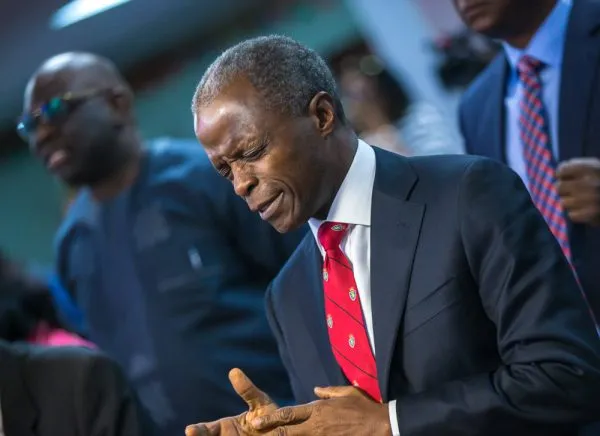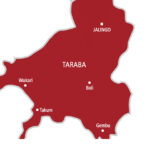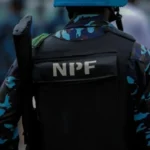The storm rippling across the political camp of Vice President Yemi Osinbajo has initiated a difficult conversation in which, as usual, there’s no room for nuance. As the intellectual poster-child of the executive branch of the federal government, the trending colouring of the politician in two scathing critiques by US-based writer and columnist, Professor Farooq Kperogi, has left his political appeal, especially in the North, diminished.
Kperogi’s ten-point case against Osinbajo, he claimed, would instigate a “religious civil war” if overlooked. Either in assessing the Vice President’s affiliation to the Redeemed Christian Church of God (RCCG), advocacy for Christian candidature and pathologizing of the non-Christian agenda, the allegations compiled by the critic have sparked a fierce debate reminiscent of the media clampdown on the Minister of Communications and Digital Economy, Dr. Isa Ali Pantami, when his unflattering past as a preacher was excavated, triggering a cascade of reactions.
- Why Nigeria’s N261.8bn catfish industry is in danger
- Intrigues, realignment in PDP as North pushes for open contest, South zoning
Osinbajo is to the Pentecostal Christians what Pantami is to the Sunni Muslims, and both ride on high academic profiles that offer them an upper hand among the political class and in pledging allegiances to two publics—the secular and the religious. The evangelical burden upon them, therefore, thrives on de-marketing belief systems other than theirs, and such polarizations have come to be a part of us. At least until they found themselves in the political spotlight, and forced to tone down their otherisations of “rival” religions and sects.
Mounting a pulpit in a multicultural society is a tricky enterprise, and our religious leaders have been reckless in dispensing divisive sermons to sell divine images of the afterlife or in dabbling in politics. Our places of worship have become the engine rooms of incitements to mutual hatred and violence, and the clerics have functioned as mouthpieces of such a dangerous fad. The clerics also get to evade scrutinies and backwashes of their utterances, which, in legal terms, are outright hate speech.
The transition from the pulpit to politics is a life that hasn’t played out well for so many clerics, especially those who attempt to join national politics. When, for instance, Pantami was appointed as Minister, those with no knowledge of his professional bearing assumed he was a chess piece of Buhari’s Islamization agenda. His PhD certification had to be fiercely marketed to silence his critics. It didn’t take long before his name began to trend as a potential Vice Presidential candidate and, suddenly, his past came to haunt him, and Kperogi led the charge in contextualizing and countering Pantami’s commentaries on sensitive global trends, especially on the Taliban’s and the Al-Qaeda’s reign of terror in the Middle East, concluding that the preacher was unfit to hold a sensitive public office in Nigeria.
Kperogi’s red card to Pantami, whom he has undressed to the point of what some would consider obsession, isn’t different from the grenade thrown at Osinbajo’s political cart. It may take a miracle to piece the carcass of the Vice President’s political future together, especially in the North where Kperogi’s allegations have been translated into various local languages and passed from one Facebook page to another, and one WhatsApp account to another. The response of the Vice President’s media team to this potential funeral of their principal’s political career has been tragic, especially their resort to calling them a hatchet job or attributing them to perceived rivals.
I enjoy following the love-hate relationship between Kperogi and his fans on social media, specifically the one-dimensional thinkers quick to praise him for his unfavourable takes on the affairs of a certain region or religion, but suddenly rush to label and antagonize him when he dispenses similar energy to criticize the things, issues and places they too promote or revere. Those who had praised him when he tore Pantami apart, and even branded him “fraudfessor” over his questionable appointment as Professor of Cybersecurity by the Federal University of Technology, Owerri, have suddenly resorted to doubting his mental health.
One doesn’t have to agree with everything Kperogi writes, being human with emotional vulnerabilities, but he’s arguably the most independent-minded social critic practising in our space today. He’s not necessarily the most objective commentator on Nigeria, but he’s one fearless writer you can never dismiss as a hired hack. Those stuttering in their attempts to profile him as a sectional ambassador, a northern or Muslim puritan, obviously have no idea who he is—and that he’s as fierce in his deconstruction of the affairs of Muslims and northerners as he is of the Christian and the southern. He never minces words.
I don’t know Osinbajo well enough to agree with the scathing profiling done by Kperogi beyond his eloquent public addresses and humanizing engagements with the masses, but arguing that Kperogi’s views were sponsored or done to support a political camp or opponent has to be the silliest critique of a critic who’s rubbished even the political options Osinbajo himself must’ve regarded as threats.
Kperogi wrote that “(m)ost politicians exploit religion to gain political power, but Osinbajo wants to exploit political power to advance a narrow, divisive religious agenda,” in listing the Vice President’s political transgressions, and that such is “a big difference, and it’s a potentially destabilizing difference.” But the manifesting profiling of Osinbajo as a religious bigot by a segment of northerners isn’t different from Buhari’s tragic public relations in the South from the moment he embarked on his frustrated bid to run for President ahead of the 2003 presidential elections. He was panned and projected as a Shariah-obsessed “extremist” unfit for leadership in a secular country.
Yet the formula Buhari applied to overcome his political disapproval in the South, which is appealing to the Muslim North to counter the insatiable South, is one Osinbajo can’t risk adopting. Even though he lacks Buhari’s cult following, choosing the pulpit as a political base jeopardizes his ambition. The North is a vote-generating bloc in which no politician can risk becoming a pariah, and Osinbajo may need more than fancy speeches and the pulpit to neutralize the danger of his portrayal as a clannish public officer. His image-makers must think beyond “divide-and-conquer” tactics to show that he’s not the man in Kperogi’s stories.

 Join Daily Trust WhatsApp Community For Quick Access To News and Happenings Around You.
Join Daily Trust WhatsApp Community For Quick Access To News and Happenings Around You.


